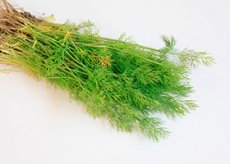
All iLive content is medically reviewed or fact checked to ensure as much factual accuracy as possible.
We have strict sourcing guidelines and only link to reputable media sites, academic research institutions and, whenever possible, medically peer reviewed studies. Note that the numbers in parentheses ([1], [2], etc.) are clickable links to these studies.
If you feel that any of our content is inaccurate, out-of-date, or otherwise questionable, please select it and press Ctrl + Enter.
Dill in pregnancy: about the benefits and not only
Medical expert of the article
Last reviewed: 04.07.2025

You know that ordinary garden dill contains many substances useful for the body, but you doubt whether dill can be eaten during pregnancy?
In this article you will find reasonable answers to many questions regarding the use of dill - fresh and in the form of a decoction of its seeds used to treat various diseases - during pregnancy.
Dill seeds during pregnancy
Due to the diuretic properties inherent in this plant, dill during pregnancy against edema helps almost all expectant mothers whose body cannot cope with the increased volume of fluid. At the same time, you can solve such a problem as bile stagnation in the liver, imbalance of intestinal microflora, intestinal colic, constipation and flatulence during pregnancy.
Moreover, if for vitaminization it is necessary to eat fresh dill greens, then for edema and constipation it is necessary to use its dried seeds (Fructus Anethi). Considering the powerful bactericidal and anti-inflammatory properties of dill flavonoids and terpenes, dill can be used in the same way for cystitis during pregnancy.
What is better to prepare: a decoction of dill during pregnancy or an infusion? More useful substances will be preserved if, in case of problems with the intestines or bladder, you prepare an infusion of dill during pregnancy, that is, do without the boiling process. For a glass of boiling water, you will need a dessert spoon (or a tablespoon without a slide) of dry seeds. In a tightly closed container, pour the seeds with lukewarm boiling water until the temperature of the infusion decreases (about 40 minutes), and then strain.
How to drink dill during pregnancy? Herbalists recommend taking dill infusion 100 ml - once or twice a day, half an hour before meals.
Is it possible to eat dill during pregnancy?
After all that has been said about the benefits of this spicy flavor plant, we cannot ignore the substances in its composition that should convince pregnant women not to get carried away with the use of dill infusion.
Firstly, dill, due to its high magnesium content (more than 250 mg per 100 g of dry seeds), helps to lower blood pressure, so it is contraindicated for low blood pressure.
Secondly, the flavonoid kaempferol, of which 100 g of dill contains almost 13 mg, reduces the absorption of iron, and if a woman takes iron-containing drugs prescribed for anemia, then she should not drink dill infusion. In addition, biochemists have discovered the ability of this flavonoid to inhibit the production of a special protein VEGF - endothelial growth factor, necessary for the formation of the vascular system of the embryo.
Dill seed contains isoestagol (a derivative of propenylbenzene) anethole, which has all the properties of phytosterols. True, dill contains six times less phytosterols than sesame seeds, and four times less than sunflower seeds, but almost as much as legumes (beans and soybeans). But pregnant women do not need extra hormones, even if they are plant-based…
The phenolic ether myristicin contained in dill seeds (which repels pests from dill beds) not only has bactericidal and anti-inflammatory properties, but can also cause hallucinations if overdosed. But umbelliferone, which relieves smooth muscle spasms, can cause depression if consumed in excess as a decoction of dill seeds.
You may not need dill during pregnancy, meaning its seeds, but in folk medicine it is often used after the birth of a child – to increase the production of breast milk.
By the way, the Journal of Herbal Medicine recently published a report of a study conducted by specialists from the Faculty of Nursing and Midwifery at the University of Medical Sciences in Tehran, according to which dill seeds facilitate childbirth and reduce the intensity of pain accompanying natural childbirth.
Benefits of dill during pregnancy
The composition of this widely used representative of the Umbelliferae family confirms that the benefits of dill during pregnancy as a source of substances useful to the body are indisputable. Thus, dill greens contain vitamins A, C, PP (nicotinic acid), B vitamins (except B12), dietary fiber, polyunsaturated fatty acids and amino acids, macro- and microelements, including potassium, calcium, magnesium, iron, copper, phosphorus, zinc.
For its strong refreshing smell, dill received its official name - "fragrant". And this garden old-timer owes this smell to essential oils, which are contained mainly in its seeds. And essential oils are a set of terpenes and terpenoids: carvone, limonene, pinene, camphene, dipentene, etc. - are needed for the synthesis of enzymes, bile acids, hormones. At the same time, limonene copes well with the dissolution of cholesterol, so dill should be consumed for atherosclerosis and cholesterol stones in the gallbladder.
Dill seeds also contain phenolic esters (atenol, myristicin), coumarins (umbelliferone, khellin) and flavonoids - quercetin, isorhamnetin and kaempferol. Quercetin and isorhamnetin act as active antioxidants, diuretics and antispasmodics, and also have quite strong anti-inflammatory properties. In addition, they suppress the proliferation of bacteria in infection foci and act against staphylococci, streptococci, E. coli, pseudomonas and salmonella. Therefore, fresh dill should be added to dishes during pregnancy, and doctors advise, if necessary, to consume a decoction or infusion of fragrant dill seeds.

